TAKEAWAY: This is part three of a series of four blog posts to discuss and to analyze the role of advertising in tablet editions of newspapers and magazines. Today: how we can engage readers through powerful and direct storytelling.
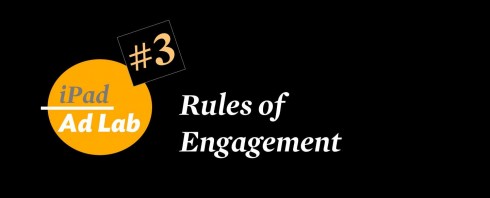
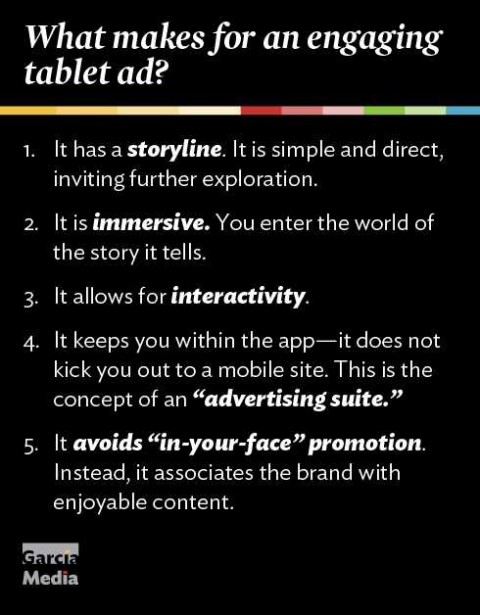
Some call it appvertising, a term which I find appropriate if it helps to move us in the direction of a new definition for ads that appear on the tablet, with emphasis on a basic requirement: engagement.
Engagement in tablet ads, to be very sure, will involve rich media ads, and not the static variety. Once there is some type of interactivity, things begin to happen between user and the ad.
But this is not enough to guarantee staying power of the user over the ad.
For the user, the anticipation that engagement generates will lead him or her to one of the following: information, entertainment, fun (as in the form of a game), and, ultimately to what may be a shopping experience, although this may not be the final and/or desired outcome.
With engagement comes familiarization with the brand and its offerings, information that can be stored away for possible action—as in shopping.
What, then, are the basic rules of engagement?
1.There is a story line. It is simple. It is direct. It invites further exploration.
2.Transports you to a place where story takes place.
3.Allows for interactivity
4.Keeps you within the app, not kicking you out to a mobile site, thus the concept of the “advertising suite” to be discussed in our Friday segment of the iPad Ad Lab.
5.It avoids in your face promotion of the product, instead related the brand to enjoyable content
What do we know about levels of engagement
*47% of tablet users engage with ads: According to the Interactive Advertising Bureau, “When asked if they engage with ads more than once a week ,that is, click on an ad for more information ,47 percent of tablet users responded yes, compared to 25 percent of smartphone users. Tablet users were also more likely to take action on the ad (that could mean buying something, downloading something, filling out a survey, or visiting another site): 89 percent of tablet users took action versus 80 percent of smartphone users. Here you can see that both numbers are quite high.”
*A majority of tablet/e-reader users interact with ad: New research from GfK indicates that the interactive moments in tablet editions are getting used, especially in advertising. In looking at 30,000 ads across 1,000 magazine issues, GfK MRI Starch Digital found a majority of tablet or e-reader edition readers both noticed and interacted with an ad.
Highlights:
The research shows that 55% of digital magazine readers noted or read, a digital advertisement on their tablet or e-reader. Among those who noted an ad, 52% took an interactive action as a result. The most common ad interaction was touching or clicking the ad to expand it (38%).
When an ad featured a video or commercial, 31% of ad readers watched it. Viewing a gallery and downloading an app were actions taken by 30% of ad readers. Other interactions taken by digital ad readers were touching or clicking the ad for more information (27%) and accessing a social network through the ad (24%).
Heavy Tablet Users Respond More Positively to Ads:: The Online Publishers Association tested two segments: people who multitask on two or three screens while using their tablet and people who have purchased content on their tablets. The OPA found that people in both segments responded more positively to tablet ads and were likelier to take action (such as clicking on the ad or making a purchase) than those who interacted less with their tablets, according to the study. Additionally, iPad tablet owners had a slightly more positive attitude toward advertising than did Android owners.
A chat with Paul Mestemaker, co-founder of Mythly Studios
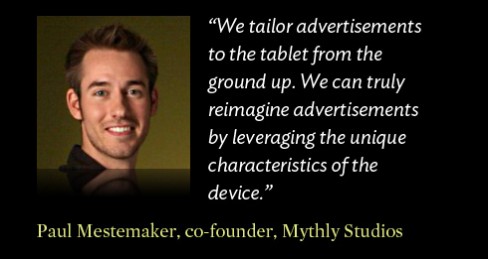
As we explore all that is possible for tablet advertising, let’s meet Paul Mestemaker, co-founder of Mythly Studios, in Los Angeles. Paul describes his
company’s mission as “to empower people to create immersive story-telling experiences on tablets.”
Paul, like some of us, feels that the state of tablet advertising is not where it could be.
“If advertisers approached TV commercials the way they approach tablet advertising, they would shoot the print magazine portion of the campaign and then try to clumsily retrofit those assets into a TV spot. Imagine how much of a disaster that would be! Instead, if we tailored advertisements to the tablet from the ground up, we can truly re-imagine advertisements by leveraging the unique characteristics of the tablet,” he said.
Paul has shared some of the work Mythly Studios has done, so I asked him about some principles that they carry to these projects, which are all applicable to good storytelling for tablet ads.
In his view, these are some traits unique to tablet that must be explored and experimented with:
Immersive ad experience within app:
I was talking with someone fromAOL: Autos backstage at TechCrunch Disrupt this year. She loved our Toyota Prius v ad. One reason she cited was because it didn’t kick her out to a mobile site. She stayed within the app and had a premium experience that she could explore. So even if the iPad is connected to wifi, many consumers may be more willing to explore ads if they know it won’t swap them out of the app to some crappy mobile experience.
Can use an array of sensors:
Motion detection through accelerometer/gyroscopes can provide a layer of subtle interactivity. We used this in our Toyota Prius v ad that was deemed Yahoo! Ad of the Year in 2011. Using the location sensors, you can provide hyper-targeted ads. For example, imagine you’re inside a mall using wifi at a Starbucks and then getting a hyper-targeted ad that announces a 1 day only sale on the other side of the mall. There is also a lot of research to use cameras to augment the world around you and apply it in a useful manner to mobile content.
Can create next gen branded content:
The form factor of the tablet combines the ease of mobile consumption of a magazine with the computing power of a PC. Instead of in-your-face interruptive advertisements (TV commercials), we can have engaging branded content. Vogue has already accomplished this in the print medium as the advertisements in the magazine are as much content as the editorial piece. High-end brands already do this because they understand the impact it has. L’Odyssée de Cartier and Cartier: Winter’s Tale were two stellar examples from this year.
However, Paul and his team are also aware that the customized tablet ad is also more expensive to produce.
Because tablet advertising is at the bleeding edge, we have to be sure to not gloss over some of its growing pains. Reimagined ads cost more money to produce than standard web ads. With anything new, there is a learning curve. Some people are experimenting now with ads specifically designed for tablets, but it’s certainly a small percentage of experimental ad spend vs. major portions of budgets. HTML5/js is still very new compared to Flash. Fewer people can make an ad shine in HTML5 vs. Flash. Plus it’s a huge pain to test across devices. Sometimes you run into problems with limitations like the processing speed or mobile browser rendering engines. All of this adds to the total cost of publishing a quality tablet ad.
For many this is too much pain. At Mythly Studios, we aim to be the best in the industry at building tablet content. We are building proprietary in-house tools to help us avoid these pains. One day we will share these tools so that content producers can focus on their creativity and not have to worry about the internals of getting their ad to work on tablets.
As Paul notes, when you design an ad for a tablet experience, you have fewer places to run that ad than on the web. There’s a lot of overhead in planning the executing and placement of a new ad format.
Some examples from Paul:
Toyota Prius v
Paul Mestemaker:
Taking this line of creative thinking forward, we built a tablet ad from the ground-up. We leverage the motion sensor for some subtle interactivity and playfulness. Once you’re in the ad, we provide multiple tap zones where you can explore the lifestyle associated with the Toyota Prius v. The visual effects are incredible when viewed on an iPad
Yahoo! & Toyota Prius v:
https://vimeo.com/53400406
My observations: Here we are instantly engaged through music, storyline and the way the ad transports the users to a different place.
Directors: Alexx Henry’s Concept Design: Cory Strassburger ,Technical Director: ikrima Visuals
Produced by Alexx Henry Studios
Anheuser Busch InBev
Paul:
We are proud of what we’ve accomplished so far, but there are even more transformative experiences possible. We built an augmented reality app for Anheuser Busch InBev. This was a really fun project. We invited a model into our studio and then created a photo-realistic digital representation of her. We then combined that with some other 3D assets, a game engine, and real-time camera feed analysis software. When you open this app and point your iPad’s camera at a Budweiser coaster, it will recognize the coaster and in real-time augment what you’re seeing. The video doesn’t do this justice, but the amazed look on people’s faces when we show them in person is incredibly rewarding.
Augmented Reality for Anheuser Busch InBev:
https://vimeo.com/54635427
For more information, check out Mythly Studios
Key parts:
¨Fast Markerless tracking’
Real time rendering of photorealmodel
Realtime IK animation: Real-time compositing with video plate
Aesop’s Fables pave the way
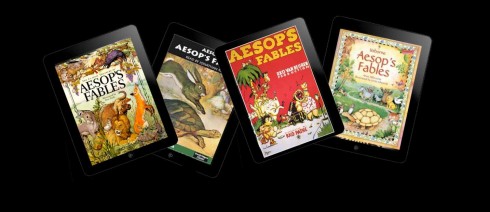
Those Aesop’s fables provide us with a great blueprint on which to base the simple, but effective, storytelling that is required with tablet ads.
If there is a master storyteller who championed the art of the very short story (pre-Twitter, although more than 140 characters), it is Aesop, who lived in ancient Greece between 620 and 560 BC. I was fascinated by his fables when I first discovered them in junior high. Aesop would take life’s most humble incidents and weave them into a very short story to teach great truths; at the end of each fable, a reminder of the lesson.
Basically, the premise of all good stories, but, especially, advertising.
And, I would like to add: very especially, tablet advertising.
I would urge anyone trying to create the best and most innovative tablet ads to take a clue from Aesop.
In fact, it was Aesop who inspired the philosophy for how my book, Pure Design, was created: short takes, instead of chapters. I refer to the fables often, and always learn something new
Download a free copy of the digitized version of Pure Design:
http://issuu.com/mariogarcia/docs/mario_garcia_pure_design
Looking at the fables
http://www.umass.edu/aesop/fables.php
Here is one of those fables from Aesop
The Fisher and the Little Fish
It happened that a Fisher, after fishing all day, caught only a little fish. “Pray, let me go, master,” said the Fish. “I am much too small for your eating just now. If you put me back into the river I shall soon grow, then you can make a fine meal off me.” “Nay, nay, my little Fish,” said the Fisher, “I have you now. I may not catch you hereafter.”
A little thing in hand is worth more than a great thing in prospect.
Ralph Lauren ad for the NY Times
One of the earliest, and most memorably engaging tablet ads I recall, Ralph Lauren, for The New York Times. The Ralph Lauren creative team put together a magazine, complete with a table of contents, and regular features, which, in turn, told the story of a variety of the fashion designer’s products.
The stories told, the ambience set, created a story that was interesting and engaging, whether one was particularly interested in shopping for Ralph Lauren products or not.
That is the key: engagement, the product not in your face, but never too far away. And, at the end, a memorable enough experience which may lead to the Ralph Lauren counter at the store, or online, and not necessarily right the minute we have read the story or experienced the ad.
Take a look at the Ralph Lauren sponsorship advertising for The New York Times’ tablet edition:a beauty
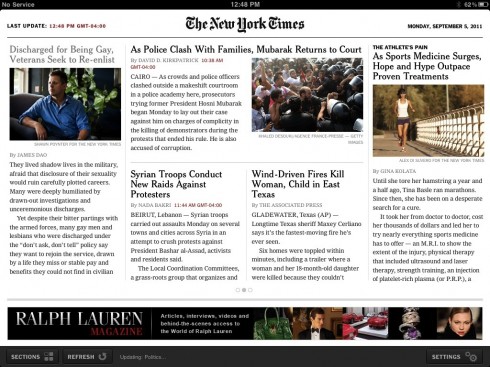
The ad starts as a simple, non-eventful strip ad at the bottom of the Times’ opening page. You tap it and get into the Ralph Lauren Magazine
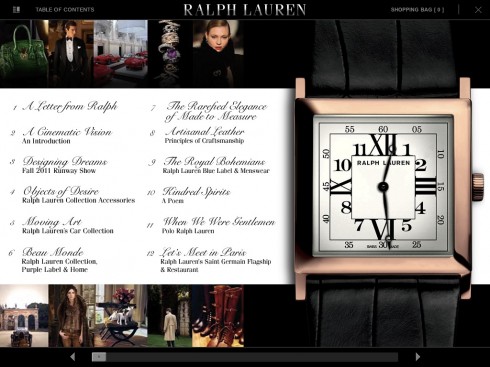
The table of contents page: classic, sophisticated, and, a Ralph Lauren iconic watch that actually gives you the correct time!
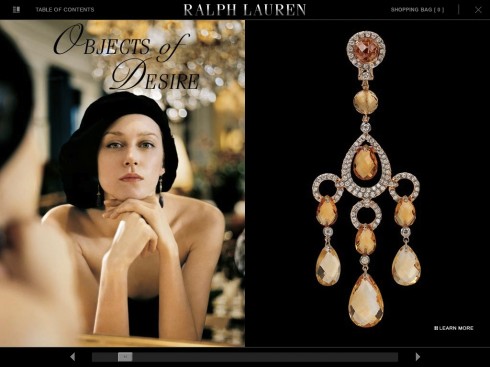
Here is the opening of the Objects of Desire page
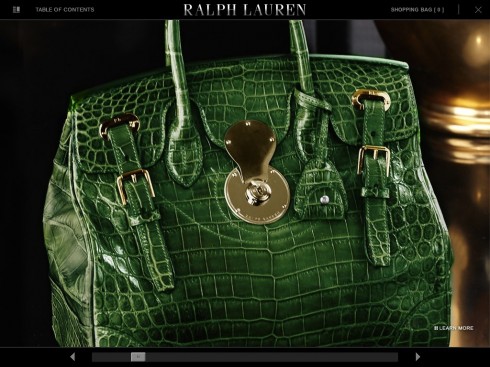
Want a green crocodile skin bag?
Of related interest:
Data Points: Tablet Advertising As publishers’ apps proliferate, the use of bells and whistles declines
http://www.adweek.com/news/technology/data-points-tablet-advertising-145567
What Audiences Want: Study Uncovers Possible Futures for Storytelling
 http://latd.com/2012/08/15/what-audiences-want-study-uncovers-possible-futures-for-storytelling/.
Advertising: from Mad Men to Ralph Lauren: Five Innovative Tablet Ads
 http://www.economistgroup.com/leanback/advertising/from-mad-men-to-ralph-lauren-5-innovative-tablet-ads/
Coming up in the IPad Ad Lab series
Friday: Those comfy advertising suites
(Showcasing some who get it right) Plus: Taking a proactive role for better tablet ads (tips for those of us on the editorial side, for the ad agencies, and for the brands)
Previously in the iPad Ad Lab series:
The iPad Ad Lab #1: Wrap that Ad Around a Story
https://www.garciamedia.com/blog/articles/the_ipad_ad_lab_1_wrap_that_ad_around_a_story
The iPad Ad Lab #2: Kill Those Banners
https://www.garciamedia.com/blog/articles/the_ipad_ad_lab_2_kill_those_banners
Take advantage of our iPad Design/Ad Lab workshops
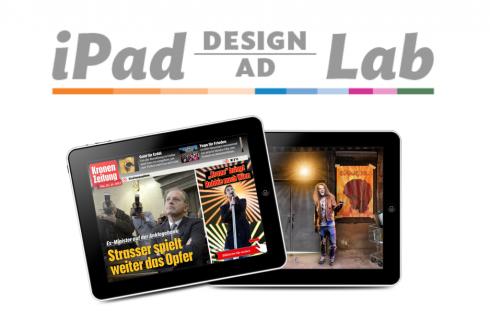
Do you want to take your brand to the next level by creating a tablet edition? Garcia Media can help. We now offer one- to two-day iPad Design Lab workshops on demand to jumpstart your presence on this exciting new platform. We also offer âiPad Ad Lab workshops to develop engaging advertising models for your app. Contact us for more information.

Purchase the book on the iBookstore
The EPUB version of book is HERE:
Now available: The EPUB version of iPad Design Lab: Storytelling in the Age of the Tablet, ready for download via Amazon.com for Kindle:
http://tinyurl.com/8u99txw.
Take a video tour of iPad Design Lab
“iPad Design Lab” trailer on Vimeo.
Read the Society of Publication Designers’ review of The iPad Design Lab here:
http://www.spd.org/2012/10/must-read-ipad-design-lab.php

Keep up with Mario Garcia Jr. via Garcia Interactive: helping transform online news since 1995.
www.garciainteractive.com
Here’s a gift you don’t have to wrap!

It’s official. The Christmas/holiday shopping season is here.
Here is a suggestion for someone on your list, the digital book iPad Design Lab: Storytelling in the Age of the Tablet. No need to stand in line, no need to buy wrapping paper. Just send it to someone you think might enjoy a book about this magnificent new platform that is the tablet, and how to maximize its potential for storytelling.
Here is how you can get the book:
The original version of the book is the multitouch textbook version available on the iBookstore for iPad (iOS 5.0 and up):
https://itunes.apple.com/book/ipad-design-lab/id565672822. This version includes video walkthroughs, audio introductions to each chapter, swipeable slideshows, a glossary and a sophisticated look and feel.
Apple only sells multitouch textbooks in certain countries at this time, unfortunately. Copies are available in at least the following countries: Australia, Austria, Belgium, Canada, Finland, France, Germany, Great Britain, Greece, Italy, Latvia, Luxembourg, The Netherlands, Poland, Portugal, Romania, Slovakia, Spain, and the United States.
For those in other countries and without an iPad, we have made the book available in a basic edition for other platforms. This basic edition includes the full text of the original, along with the images and captions, but lacks the other features such as audio and video. It is available on the following platforms in many countries:
Amazon Kindle: http://amzn.to/SlPzjZ
Google Books: http://bit.ly/TYKcew
Scribd: http://bit.ly/PQTwla